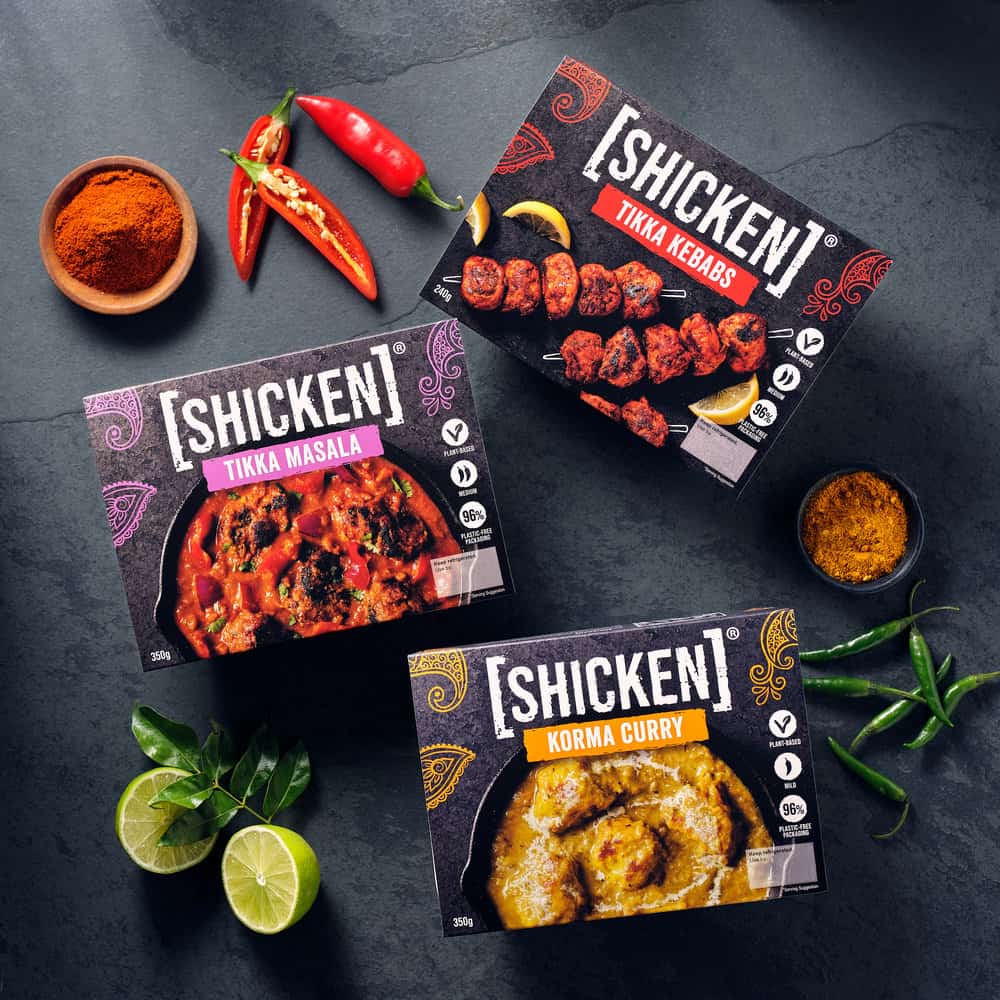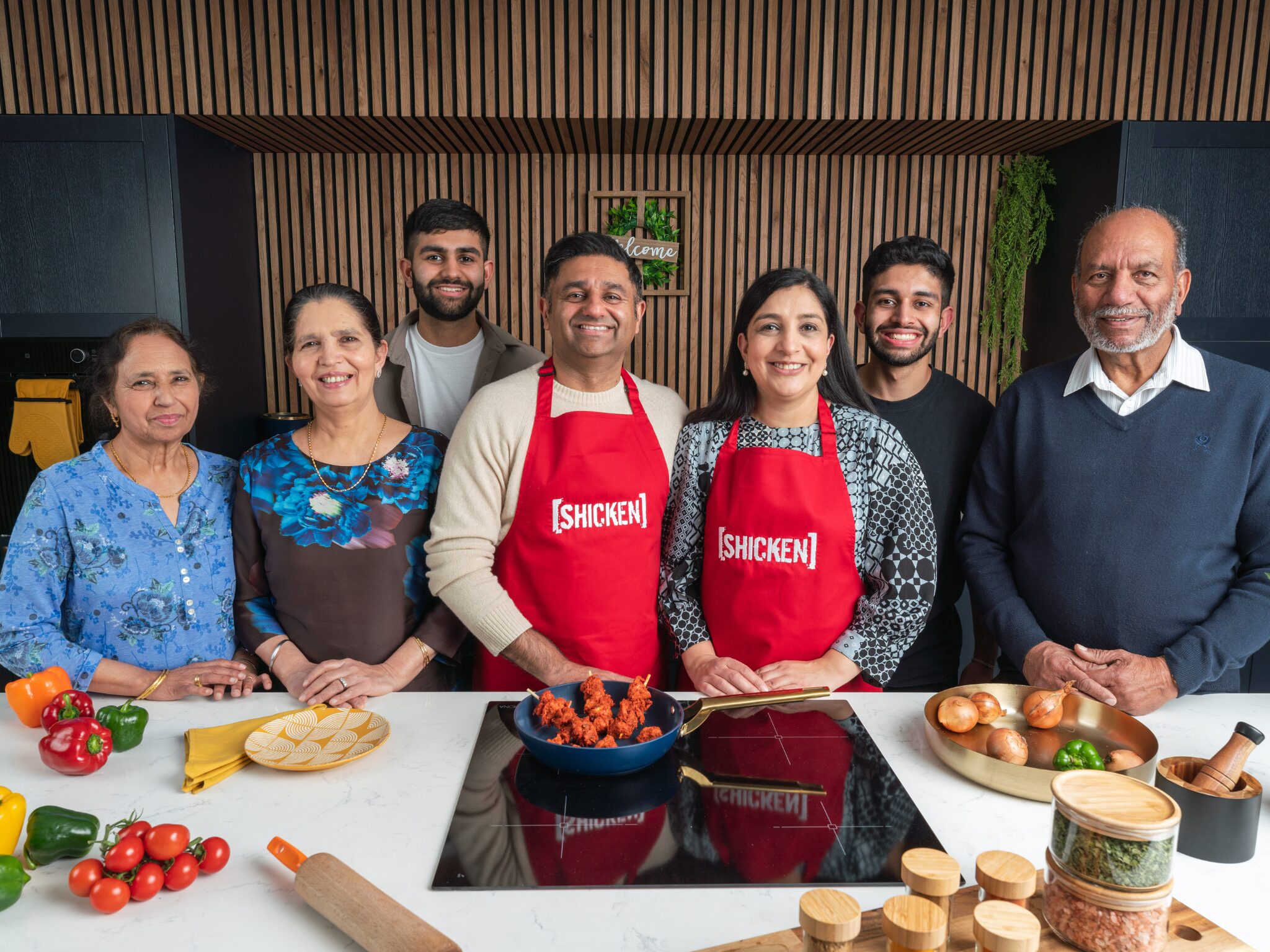Shicken Secures Additional £4M Funding from Veg Capital to Scale Up Asian Alt-Meat Portfolio
5 Mins Read
UK startup Shicken has raised £4M in funds from Matthew Glover’s Veg Capital, which has tripled its investment in the plant-based meat brand. The financing will go into a manufacturing facility to scale up production of its Asian-inspired meat analogues.
A family-owned brand rooted in the founders’ Indian heritage, Shicken has secured an additional £4M in investment from Veg Capital, taking its total injection into the ready meal company to £6M.
The startup will use the capital as further capital expenditure into its manufacturing facility to increase the production capacity of vegan tikka and curry SKUs. Having recently received accreditation from the British Retail Consortium, the scale-up will make the Kent-based site one of the UK’s only dedicated plant-based, nut-free factories, and enable Shicken to produce a range of both branded and private-label products for retail and foodservice.
The investment will also fuel the expansion of its distribution both domestically and overseas, following Shicken’s launch into 380 Sprouts Farmers Market stores in the US in January, alongside a Teriyaki Kebab Skewer SKU – its first non-Indian product – at Costco in the UK, Iceland, Sweden and France. And in January 2023, the company gained a listing at Tesco, the UK’s largest supermarket, rolling out into 471 stores nationwide. This year, it expects to achieve five times its current growth.
Traditional family recipes for modern Indian food

Shicken was founded as a D2C business during the Covid-19 lockdown in 2020 by husband-and-wife duo Parm and Satvinder Bains, who were already experienced campaigners in the food industry. Going back to 2003, the pair launched a vegan chicken breast under a brand called Love Foods, which was bought out by the Co-op and saw its listing cease.
However, the Bains retained the IP for the recipe as they moved on to other ventures. Parm worked with multinational food manufacturers to develop and launch private-label products for multiple UK retailers, while Satvinder initiated a Punjabi catering business. When they eventually started Shicken out of their family kitchen, the company was discovered by Glover, whose firm made an investment based on the product’s quality and proposition.
“It has been a phenomenal journey for Shicken so far and we’re incredibly excited to see business scale on an international level, both as a brand and as one of the UK’s few dedicated BRC-accredited specialist primary plant-based manufacturers,” said Parm.
“Veg Capital has been the perfect partner, aligning with our commitment to a more ethical and sustainable food system and backing our potential to become a global brand and major plant-based producer within the next five years,” he added.
Shicken’s plant-based chicken is made from a blend of soy, wheat and pea proteins using tech that the brand claims imparts “a succulent chargrilled chicken-like texture”. This is then used in products ranging from tikka kebab skewers and Madras curry to butter chicken and rogan josh, which are based on recipes passed down by Satvinder’s grandmother.
Navigating a tough market by meeting consumer demands

“The Shicken range is simply delicious, and their curries and kebabs are flying off the shelves – it was a no-brainer for Veg Capital to reinvest,” said Veg Capital founder and director Matthew Glover. “We’re excited to play our part in helping this family business go global over the coming years.”
Glover is also the founder of Veganuary and fellow vegan chicken brand VFC, which recently evolved into a holding company called the Vegan Food Group, acquiring fellow plant-based businesses like Meatless Farm, Clive’s Purely Plants and Tofutown in its bid to become “a vegan Unilever”.
The investment in Shicken comes after a year where global agrifood tech funding fell by 51%, and a cost-of-living-hit market cultivated a difficult environment for plant-based companies. Meatless Farm, for example, fell into administration before being rescued by VFC, while legacy company VBites was destined for the same fate before it was bailed out by founder Heather Mills. Industry giants like Quorn posted losses too, and a number of vegan restaurants shuttered.
In fact, meat-free products were among the worst-performing grocery categories in the UK in 2023, with sales declining by £38.4M, and volumes down by 4.2%. However, one of the brands that did do well was VFC, whose sales exploded by nearly 200% year-on-year. “Whilst it’s a tough trading environment, I do feel like we’re soon to be over the worst of it,” Glover told Green Queen in February. “The signs are that the declines are reducing, and I think we’ll be cheering the news that the categories will be back in growth during this year.”
In a wide-ranging interview with Green Queen, he explained that winning back consumer trust and shifting dietary dynamics are important yet complex tasks that take time. “As we move forward, understanding and addressing these multifaceted consumer needs and concerns will be crucial for the growth and acceptance of vegan food in the broader market,” he said.
In October, a 1,000-person survey revealed that 66% of UK consumers are unhappy with the flavour of vegan meat analogues, and 62% find them too expensive. For 51%, taste and texture are the main reasons for reducing their consumption of these products. Price and health are crucial considerations, as are environmental and ethical factors. “Convenience, too, cannot be overlooked, with the demand for easy, quick-preparation vegan options rising,” said Glover.
That will be encouraging to Shicken, whose entire ethos lies in “restaurant-quality” ready meals that are cheaper than even Tesco’s own-label premium range of Indian dishes. Can Shicken help realise Glover’s prophecy for the plant-based sector this year?




